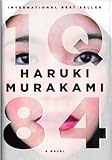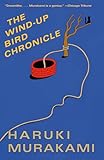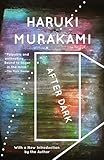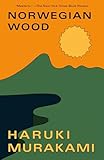1.
When will Haruki Murakami finally get a Nobel Prize? Around this time every year, the question grumbles around Japanese literary circles. And around this time every year, the answer is the same: better luck next time. For my part, I’ve always observed this ritual with a jaundiced eye. Murakami, for all of his success and considerable stylistic accomplishments, just wasn’t Nobel-worthy (hold your flames until the end, please). His output is impressive and his fiercely devoted readership has made him one of the world’s bestselling non-English novelists. But his books, which I had once found fresh and engaging, became increasingly predictable. If he hadn’t reached the limits of his talents, then it seemed that he was at least stuck in a very deep rut.
 But with 1Q84, Murakami’s latest, the bandwagon’s out of the ditch, and I am jumping on board. The book, which was a blockbuster in Japan, is Murakami’s finest work: nuanced, brilliant, gripping, philosophical but never tendentious, self-assured, cleverly post-modern yet authentic, and possessed of a haunting surrealism that by this point surely deserves its own adjective: Murakamian?
But with 1Q84, Murakami’s latest, the bandwagon’s out of the ditch, and I am jumping on board. The book, which was a blockbuster in Japan, is Murakami’s finest work: nuanced, brilliant, gripping, philosophical but never tendentious, self-assured, cleverly post-modern yet authentic, and possessed of a haunting surrealism that by this point surely deserves its own adjective: Murakamian?
Fans will find much to love. Murakami’s personal obsessions and eccentricities are on full display: cats, oddly-formed ears, European composers and novelists, and little people with strange powers. And yet, the book feels fresh in a way that Murakami hasn’t felt in a long time. It sees the familiar with new eyes. Reading it is like falling in love again for the very first time.
Murakami’s work has always depended on subverting its readers’ sense of the familiar. His stories mostly take place in an off-kilter version of reality that seems the stranger precisely because of its similarity to the world we know. 1Q84’s brilliance is founded on more or less the same principle. It is instantly recognizable, yet inexplicably strange. A Murakami novel as it might be written in a Murakami novel. The premise is high-concept, but somehow unpretentious: two people, a novelist Tengo and a part-time assassin/fitness instructor Aomame, find that they have been transported from the “real” world into a fictional one complete with two moons, giant, glowing chrysalises woven from thin air, and a dead goat that serves as a portal to yet another world. Basically, it’s a love story. And a very affecting one at that.
As might be expected, both the novel and the world in which it’s set, the eponymous 1Q84, are self-consciously literary creations, one written by Murakami and the other by the writer, Tengo, who finds himself trapped in his own book, a high stakes literary fraud based on the work of a mysterious teenage girl. Although there are a few heavy-handed ventures into explicit meta-fictional commentary (a gun, which in contravention of Anton Chekov’s famous maxim, never goes off), the border between fiction and reality, whether Murakami’s or Tengo’s, is never explicitly drawn, and the whole enterprise is carried out with such zest and lightness of touch that it never occurred to me to question the concept.

 The brisk pacing doesn’t hurt, either. The book is a doorstop of the order of War and Peace or Infinite Jest, but unlike those shambling monsters, it features a gripping, tightly plotted narrative that’s readable enough for the beach. Whereas Murakami’s previous books often built slowly and ended ambiguously, exploring in the meantime only the most quotidian aspects of his bizarre alternate realities, 1Q84 hits the ground running and never stops. Except for a slow jog of exposition in the middle, the book, which traces the mysteriously intertwined lives of Tengo and Aomame, keeps up its quick pace through over 900 pages, putting on an extra burst of speed as it comes tearing through the finish line. Most incredibly for a book of this length, it manages with only one exception to tie all of its plot threads into an elegant ending better suited to a thriller than the elephantine social novel it resembles. As a novelist, Murakami has proven himself to be a world class marathoner.
The brisk pacing doesn’t hurt, either. The book is a doorstop of the order of War and Peace or Infinite Jest, but unlike those shambling monsters, it features a gripping, tightly plotted narrative that’s readable enough for the beach. Whereas Murakami’s previous books often built slowly and ended ambiguously, exploring in the meantime only the most quotidian aspects of his bizarre alternate realities, 1Q84 hits the ground running and never stops. Except for a slow jog of exposition in the middle, the book, which traces the mysteriously intertwined lives of Tengo and Aomame, keeps up its quick pace through over 900 pages, putting on an extra burst of speed as it comes tearing through the finish line. Most incredibly for a book of this length, it manages with only one exception to tie all of its plot threads into an elegant ending better suited to a thriller than the elephantine social novel it resembles. As a novelist, Murakami has proven himself to be a world class marathoner.
2.

 After the English release of Murakami’s last novel, After Dark, critics, myself included, began to wonder if Murakami was capable of writing something that moved beyond the intensely personal (and by definition limited) confines of his best work and into the world at large. His most ambitious previous novel, The Wind-Up Bird Chronicle, hinted at the possibility, but never quite achieved it. Although the book expanded the physical and historical limits of Murakami’s world, it failed to push beyond the psychological boundaries of his main character, a cerebral, often anonymous cipher that was not quite Murakami himself. It seemed that Murakami–like the protagonist of the classic, almost psychedelic Hard-Boiled Wonderland and the End of the World–had become a prisoner of his own mind. And as time went by, that durance became a mini-genre of sorts: noir as therapy, detective stories where the sleuth trolls for clues in his own psyche but never solves the case. The essential mystery of these novels was how do you escape your own head? It seemed the puzzle was one that neither Murakami nor his characters were able to solve.
After the English release of Murakami’s last novel, After Dark, critics, myself included, began to wonder if Murakami was capable of writing something that moved beyond the intensely personal (and by definition limited) confines of his best work and into the world at large. His most ambitious previous novel, The Wind-Up Bird Chronicle, hinted at the possibility, but never quite achieved it. Although the book expanded the physical and historical limits of Murakami’s world, it failed to push beyond the psychological boundaries of his main character, a cerebral, often anonymous cipher that was not quite Murakami himself. It seemed that Murakami–like the protagonist of the classic, almost psychedelic Hard-Boiled Wonderland and the End of the World–had become a prisoner of his own mind. And as time went by, that durance became a mini-genre of sorts: noir as therapy, detective stories where the sleuth trolls for clues in his own psyche but never solves the case. The essential mystery of these novels was how do you escape your own head? It seemed the puzzle was one that neither Murakami nor his characters were able to solve.
1Q84 seems to propose a tentative solution to this conundrum: self-awareness. For the first time, Murakami does not just write, but observes himself writing. And he has expressed this new awareness of himself as a novelist in an ingenious irony. Tengo, like Murakami has so often done, literally and unwittingly writes himself into his own novel. And, yet, Tengo is not Murakami. Nor, for that matter, are any of the other characters.
The result is that, for the first time, Murakami is, as a novelist, unmoored from himself. The disassociation allows him the freedom to explore multiple perspectives, and his successful expansion into the third person has opened up a world of themes that were unavailable to him during his long period of solitary confinement. Murakami’s liberation–the book alternates chapters between the perspectives of Tengo, Aomame, and, by its third and final section, a hideously ugly private eye named Ushikawa–leads the characters to revelations that would have been unthinkable in any of his previous works. The difference is striking, and it produces some truly sublime descriptions of the human condition, expressed with Murakami’s wonderful simplicity and economy:
(Tengo) was already thirty, but yet to have a sense of himself as an adult. It just felt to him like he had spent thirty years in the world.
Or this passage, near the end of the book, that I never before would have imagined Murakami capable of:
One evening, as the cold wind blew and she kept watch over the playground, Aomame realized she believed in God. It was a sudden discovery, like finding, with the soles of your feet, solid ground beneath the mud. It was a mysterious sensation, an unexpected awareness…
3.
In part, 1Q84’s achievement comes from Murakami’s decision to write about Japan. In previous novels, Murakami seemed reluctant to seriously engage with his own country, most often placing his characters in a world that combined a fantastical fourth dimension of his own private obsessions with a jazzy transnational “West,” built on Russian novels, Beatles music and blue jeans. Much like his characters, most of whom are expats in their own lives, Murakami refused to directly engage with his environment, choosing instead to hide his characters away in caves and wells and cabins in the woods, where the only society they kept was their own.
For all its fantastical elements, however, 1Q84 is very much about modern Japanese society. It grapples with the kind of front-page social issues we expect to find in Jonathan Franzen’s latest: the historical legacy of World War II, the aging of Japanese society, and, most prominently, the rise of religious cults that led to the infamous sarin-gas attack on Tokyo’s subways.
 The difference is both superficial and profound. With the exception of his career-making novel Norwegian Wood, a work of straight realism, Murakami has generally avoided the material signifiers of Japanese culture. His characters eat pasta and other western food. They sleep in beds, rather than on futons. They move through the kind of culture-neutral spaces, business hotels and luxury apartments, that form the archipelago of the developed world. To a certain extent, this cultural shorthand is what has made Murakami’s books so popular internationally. Appreciating them requires no understanding of Japan, only a few weeks spent in any major metropolis.
The difference is both superficial and profound. With the exception of his career-making novel Norwegian Wood, a work of straight realism, Murakami has generally avoided the material signifiers of Japanese culture. His characters eat pasta and other western food. They sleep in beds, rather than on futons. They move through the kind of culture-neutral spaces, business hotels and luxury apartments, that form the archipelago of the developed world. To a certain extent, this cultural shorthand is what has made Murakami’s books so popular internationally. Appreciating them requires no understanding of Japan, only a few weeks spent in any major metropolis.
While Murakami’s other novels could have taken place anywhere, 1Q84 could only have happened in Japan. The book starts and ends in a uniquely Japanese locale, one of the elevated expressways that ribbon above Tokyo, and is peppered throughout with Japanese locations, situations, and references, both historical and otherwise, that feel nothing short of integral to the whole. Even the almost reflexive allusions to Western culture–in true Murakami fashion an obscure Czech composer and several European fashion designers are name checked in the book’s first several pages–for the first time seem to reflect something essential about Japan itself, a country that connects East and West in much the same way as the elevated expressway connects the story’s realfictional and metafictional worlds.
The result is a novel that feels more complete than any of Murakami’s previous work. Where much of his oeuvre feels somehow hollow at its core, like a literary Potemkin village, 1Q84 has real substance. It lacks the sense of rootless detachment that has characterized so many of his books, instead grounding itself and its characters in something real.
4.
A few weeks ago, in preparation for 1Q84’s release, the New Yorker published an excerpt from the novel called “Town of Cats.” In the story–one of many stories within stories that fill the book–Tengo reads a piece of short fiction, written by an obscure European author, about a man who travels by train to a town populated by giant talking cats. Fascinated by the town, he decides to spend the night, watching the cats as they go about their daily lives. By the time he’s ready to go home, it’s too late. He waits and waits, but the train never comes. After a few nights, he realizes it never will.
Tengo is fascinated by the story and reads it several times. He tells it to his dying father and his friends. Eventually, in the retelling, he realizes that he, too, lives in a town of cats, and if he’s not careful, he’ll die there. Reading 1Q84, it’s hard to avoid the conclusion that Murakami came to the same conclusion.
Will Murakami ever win the Nobel? A member of this year’s prize committee was quoted as saying that the prize has been too heavily weighted towards Europe in recent years. The comment has no doubt given fresh hope to grumblers across the world. Whether they will be vindicated or not, only time will tell. In the meantime, there is one thing that everyone should be happy about. With 1Q84, Haruki Murakami has finally left his town of cats.








